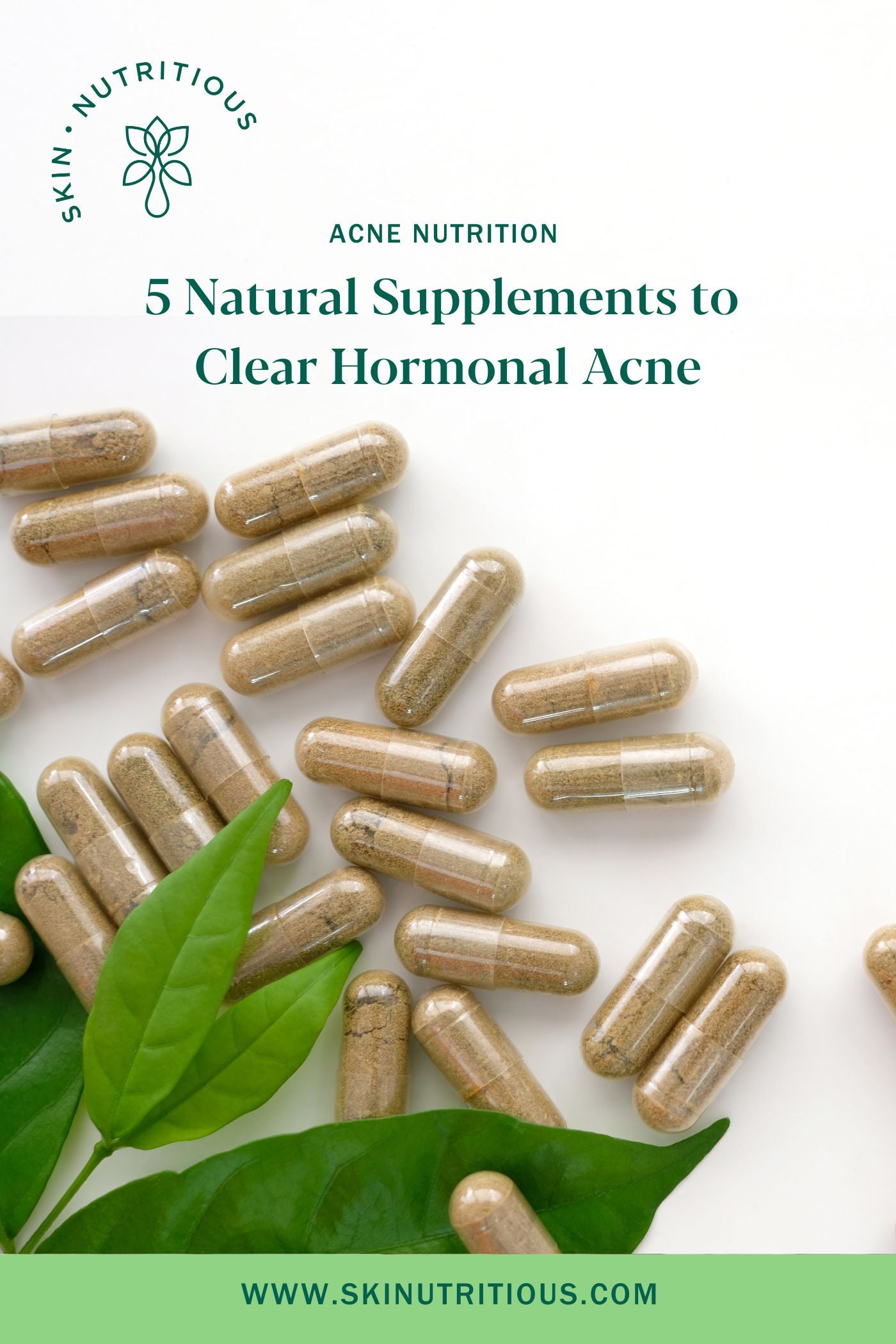Natural, Herbal Supplements to Clear Hormonal Acne

Hello acne warrior,
Ever wonder how supplements help to support clear skin? I'm so glad you asked.
Hormonal acne appears as red, painful, sometimes cystic breakouts on our skin. They are a symptom of high testosterone and DHT (androgen hormones) in the body.
These hormones are in charge of our oil production, and high levels of them drive excess oil in our skin - clogging pores and creating hormonal breakouts.
Prescription medications like birth control and spironolactone are common medical solutions that work by adding in more hormones to our system or trying to block DHT production, but not without other unwanted side effects.
Recently there has been an increased desire from the public for natural, holistic solutions to natural balancing hormonal acne from within. I support that! As a holistic practitioner, I love solutions that heal the ailment and the body in a more natural way.
A recent meta study, "An Update on Plant Derived Anti-Androgens" took a long look at natural supplements to support androgen hormone balance. Here are five of the scientifically researched herbal supplements that can help balance and clear your skin:
- Reishi mushrooms
- Saw Palmetto
- Licorice root
- Green tea
- Spearmint
Reishi mushrooms (ganoderma lucidum)
Of 20 mushrooms studied, red reishi ranked the strongest in inhibiting androgen hormone levels in the body. It helps prevent the conversation of testosterone into DHT, a hormone 5x stronger than regular testosterone. High DHT levels drive excess oil production and is a known risk factor for acne.
So those painful red bumps you’re experiencing? Taking reishi mushrooms may help by naturally balancing acne hormones! My favorite brand? Paul Stamets' Host Defense.
Saw Palmetto
Saw palmetto is a type of palm tree found in southeastern United States. It is commonly recommended by Naturopathic doctors for treatment of symptoms like acne, hirsutism (dark facial hair), and PCOS.
It contains fatty acids called liposterols which, like red reishi, has been found to suppress the conversation of testosterone into DHT. By lowering high DHT levels, we may help normalize oil production in our skin and prevent acne from forming in the first place.
So those super painful red bumps that last for weeks? Saw palmetto may be able to help.
Licorice (glycyrrhiza glabra)
Licorice has been used in medicinal remedies for thousands of years, for things from common colds to liver disease. For acne, it may also reduce testosterone levels (the hormone that drives our oil production).
In 2004, a clinical trial found that licorice root "significantly decreases testosterone levels in healthy female volunteers." Women taking daily licorice root experienced a drop in testosterone hormones after one month. Testosterone levels returned to normal after discontinued use.
Supplementing with organic licorice extract daily may help our bodies to balance out acne hormones, lessening the emergence of new pimples. Promising research for a simple, cost-effective, and accessible plant medicine!
Spearmint (mentha spicata)
Spearmint tea is commonly used in the Middle East as an herbal remedy for hirsutism (dark, coarse hairs) in women. It has anti-androgenic properties that reduce the level of free testosterone traveling in our bloodstream.
A small study of 21 females who drank two cups of tea for 5 days had significant decreases in free testosterone. And another randomized clinical trial showed that drinking spearmint tea for 30 days significantly reduced androgen hormone in patients too.
Drinking spearmint tea can be a wonderful compliment to a supplement routine and its herbal, non-caffeinated properties makes it a safe choice to consume any time of day. I recommend at least two cups daily.
Green tea (camellia sinesis)
This popular tea may not only be a good alternative to coffee in the morning, it might also have an anti-androgenic effect too. Green tea contains epigallocatechins, which inhibit 5-alpha reductase and the production of DHT.
Green tea does contain caffeine, so it’s best to consume before 2pm. After that, it may have a negative impact on our ability to fall and stay sleep.
What supplements can and can’t do…
If you’re in a highly hormonal acne sensitive body, supplements can potentially help lessen your body’s sensitivity. It can support you within a larger acne plan that also targets diet, lifestyle, skincare, and mental health. But a pill, even a natural one, will probably not solve all our skin problems.
I highly recommend that supplements be used in as a part of a complete holistic plan to address the root cause of one’s acne. While supplements can help support our body’s sensitivities, we still need to get behind what’s causing the breakouts to truly get them to stop.
In my acne clinic, I typically start clients on a targeted diet, lifestyle, and skincare plan first and potentially incorporating supplements down the line. Skincare and diet changes are the most powerful combination I have seen in clearing acne, with supplements being a supportive part of in one’s acne toolkit.
If you've tried supplements for acne and are still breaking out, you may need additional support. I work with clients 1:1 to clear their acne at the root. Learn more here about working with me in-person in San Francisco or in my virtual acne clinic:
May you be happy, healthy, and free!

Elise May, CN + LE, is a holistic acne esthetician + nutritionist, and founder of Skin Nutritious.
Since 2009, she has helped over 1,600 clients overcome acne with a unique blend of coaching, treatments, and holistic acne skincare.
Work with Elise in San Francisco or through her virtual acne clinic. Learn more >
RELATED ARTICLES:
- How Cow's Milk is Causing Hormonal Acne
- Acne-Safe Makeup + SPF List: Over 140+ Non-Comedogenic Products
- Oils + Acne: What's Safe For Your Skin
REFERENCES:
Grant, Paul and Shamin, Ramasay, 2011. An Update on Plant Derived Anti-Androgens. Department of Endocrinology, Kings College Hospital.
Medical disclaimer:
Always check with your doctor/pharmacist before taking any new supplements, especially if you are on any current medications. Your pharmacist should be able to assist in advising on any possible contraindications with your current prescriptions.




